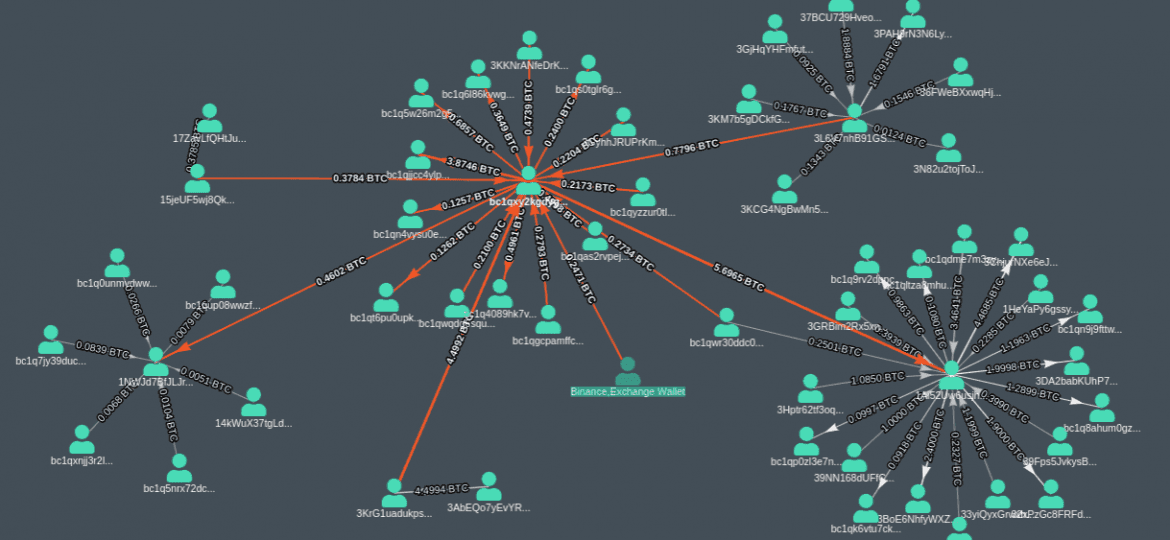
Tracing Bitcoin Transactions and Addresses
In the early days, criminals used Bitcoin as a safe haven, thinking Bitcoin is anonymous, and transactions can’t be traced. However, today, sophisticated blockchain analysis software can trace bitcoin transactions to identify criminal activities on the blockchain.
Is Bitcoin anonymous?
No, Bitcoin is not anonymous. Bitcoin is pseudonymous. In other words, Bitcoin does not store any real-world identities. However, it is possible to link real-world identities to bitcoin addresses by using bitcoin analysis software.
What makes Bitcoin traceable?
Today, bitcoin blockchain confirms ~10 million transactions every month. All these transactions are visible on the bitcoin blockchain. However, the blockchain only store addresses, public keys, and not real-world identities. Therefore, Virtual asset service providers (VASP) are the primary way to link real-world identities with bitcoin transactions. For example, VASPs such as Exchanges, wallets, custodians provide cryptocurrency services to retail users and businesses. Most of these services implement KYC (Know-your-customer) solutions. Therefore, linking real-world identity with bitcoin addresses and transactions.
How to trace Bitcoin transactions?
Standard blockchain explorers are not suitable for tracking Bitcoin transactions efficiently. For example, if a criminal is using hundreds of intermediate wallets, it can take days to track and map all those transactions.
However, our Coinpath® technology is built to trace blockchain transactions efficiently. It uses advanced algorithms to track money flow on the blockchain. In addition, our Bitquery explorer provides a money flow graph, which is a visualization tool for investigating bitcoin transactions.
Let’s see an example on how to trace bitcoin transactions idm 6.30 full using Coinpath® technology.
Recently, a Twitter hacker took the whole world by surprise when he tweeted giveaway tweets from hundreds of world leaders and influencers’ accounts.

The bitcoin address mentioned here belongs to the hacker —bc1qxy2kgdygjrsqtzq2n0yrf2493p83kkfjhx0wlh
To identify the real identity of the hacker, we will start our investigation by finding all the transactions related to the above bitcoin address. Our Coinpath® APIs give you all the source and destination addresses that sent or received transactions from any bitcoin address.
For example, in this case, the image below shows the top 10 addresses, which received bitcoins from the hacker’s address.

As we can see, a Binance exchange wallet received the transaction from the hacker’s address. However, the hacker used multiple intermediate wallets before sending money to the Binance wallet.
Note: In this case, using the Binance KYC solution, we can identify who received this money and conduct further investigation.
It would have been taken hours to trace bitcoin transactions using a standard explorer because on every layer involves multiple intermediate wallets. However, our Coinpath® technology provides this information in a single API call. Similarly, you can trace bitcoin address which sent money to the hacker’s wallet. However, in this case, the scammer was asking bitcoins publically, therefore determining who sent the money to this address is not useful because hundreds of victims sent money to the hacker.
To learn more about Twitter hack, read our complete investigation here.
Money flow graph
Visual tools are beneficial when investigating addresses and transactions. Using Coinpath® technology, anyone can build visual tools to understand the money flow. We have built one on our Bitquery explorer. You can visualize all the incoming and outgoing transactions from the hacker’s address here..
Also Read: How to show blockchain data widget on your website
Bitcoin address classification
Coinpath® Bitcoin addresses classification technology provides ways to identify patterns on the blockchains. For example, you can determine if an exchange owns a specific address by looking at the number of transactions it performs every day and the transaction amount. Usually, these patterns create different types of clusters. By analyzing these clusters, you can identify payment services, custodians, and other types of virtual asset service providers.
Now, if you are able to identify the crypto service, you can investigate the identity of every address interacting with that crypto service if it has implemented KYC solutions.
Tracing Bitcoin transactions through VASP is a much easier and the backbone of many crypto compliance solutions.
Challenges in tracing Bitcoin transactions
The bitcoin blockchain is a database of alphanumeric strings and numbers. It does not contain any real-world identity. Therefore, it presents some challenges when it comes to identifying the transactions.
- Self custody and Intermediate wallets — It is effortless to create thousands of wallets on the bitcoin blockchain and self-custody your funds. As we discussed in our last blog, cryptocurrency money laundering, criminals create intermediate wallets and process funds through these intermediaries to remove the source identity.
- Mixers — Services like mixers are build to enhance privacy. However, criminals use them to mix funds, which creates problems when tracing bitcoin transactions.
- Unregulated crypto service (VASP) — Bitcoin is a universal digital currency enabled by a public blockchain, and anyone can create services on top of it. Many countries do not enforce proper KYC/AML laws to crypto services (VASPs). Therefore, criminals process illicit funds through these services and convert them into fiat.
Use cases of Bitcoin transactions tracing
One of the most critical use cases of tracking Bitcoin transactions is in preventing bitcoin money laundering and identifying criminal activities. Law enforcement authorities all over the world use sophisticated tracing and blockchain analysis tools to prevent money laundering activities.
User privacy
Privacy is a human right established in the Universal Declaration of Human Rights (article 12). Therefore, preserving the user’s privacy should be the utmost priority for any business and enforcement agencies.
In 2019, a survey revealed that more than 11% of Americans own Bitcoin. Millions of users use cryptocurrencies for commercial purposes every day. Therefore, it is critical that businesses understand the value of user’s privacy when deploying bitcoin compliance solutions and tracing technologies.
If you are an individual who is concerned with your economic privacy, you should use proper tools and services when using cryptocurrencies.
Wrapping up
Protecting user privacy and enabling commercial activity is not a zero-sum game. It is critical for cryptocurrency adoption, that law authorities are able to identify criminal activities on the blockchain. Otherwise, we will see sweeping legislation, prohibiting all commercial activities related to cryptocurrencies.
However, users in the crypto space are more aware of privacy problems and inventing privacy-focused solutions every day, which makes tracing blockchain transactions an ongoing challenge for law-enforcement agencies worldwide.
About Coinpath®
Coinpath® APIs provide blockchain money flow analysis for more than 24 blockchains. With Coinpath’s APIs, you can monitor blockchain transactions, investigate crypto crimes such as bitcoin money laundering, and create crypto forensics tools.
If you have any questions about Coinpath®, ask them on our Telegram channel. Also, subscribe to our newsletter below, we will keep you updated with the latest in the cryptocurrency world.
Coinpath® is a Bitquery product. Bitquery is a set of tools that parse, index, access, search, and use information across blockchain networks in a unified way.
About Bitquery
Bitquery is a set of software tools that parse, index, access, search, and use information across blockchain networks in a unified way. Our products are:
-
Coinpath® APIs provide blockchain money flow analysis for more than 24 blockchains. With Coinpath’s APIs, you can monitor blockchain transactions, investigate crypto crimes such as bitcoin money laundering, and create crypto forensics tools. Read this to get started with Coinpath®.
-
Digital Assets API provides index information related to all major cryptocurrencies, coins, and tokens.
-
DEX API provides real-time deposits and transactions, trades, and other related data on different DEX protocols like Uniswap, Kyber Network, Airswap, Matching Network, etc.
If you have any questions about our products, ask them on our Telegram channel. Also, subscribe to our newsletter below, we will keep you updated with the latest in the cryptocurrency world.
Also Read
Subscribe to our newsletter
Subscribe and never miss any updates related to our APIs, new developments & latest news etc. Our newsletter is sent once a week on Monday.


